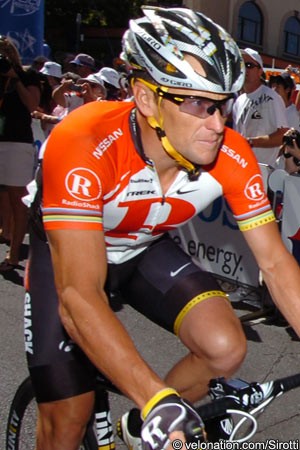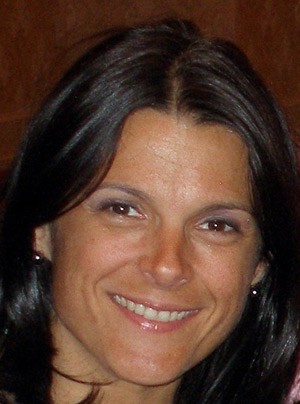“He is still desperately trying to control the narrative. The problem for him is not many are listening”
 Fourteen and a half years after he contributed to the pressure which caused Christophe Bassons to pull out of the Tour de France, Lance Armstrong met the former pro in Paris yesterday and apologised for his role in that harassment.
Fourteen and a half years after he contributed to the pressure which caused Christophe Bassons to pull out of the Tour de France, Lance Armstrong met the former pro in Paris yesterday and apologised for his role in that harassment.
Bassons raced as a professional between 1996 and 2001. He was part of the Festina team between 1996 and 1998, and was named by many on the team as being the one rider who never took banned substances.
He competed in the 1999 Tour de France, writing a column for the French newspaper Le Parisien. In the course of those articles he wrote that doping had not disappeared, contrasting with the race’s marketing by ASO and others as the Tour of Renewal. He also said that the peloton had been ‘shocked’ by Armstrong’s performances after returning from cancer.
Shunned by many of those in the race, including his own team-mates, he was pressured by Armstrong on stage fourteen to Alpe d’Huez. He later spoke about that to BBC Radio 5 in 2012.
“He grabbed my by the shoulder, because he knew that everyone would be watching, and he knew that at that moment, he could show everyone that he was the boss. He stopped me, and he said what I was saying wasn’t true, what I was saying was bad for cycling, that I mustn’t say it, that I had no right to be a professional cyclist, that I should quit cycling, that I should quit the Tour. He finished by saying *** you.”
That evening, Armstrong said on the French station TF1 that Bassons was wrong. “His accusations aren’t good for cycling, for his team, for me, for anybody. If he thinks cycling works like that, he’s wrong and he would be better off going home.”
Bassons left the race and suffered depression. Because of his stance on doping, he was marginalized and his career eventually petered out. He retired in 2001, walking away at just 27 years of age
Meeting him yesterday in a Parisien restaurant, Armstrong addressed the subject. “If this is how you’ve felt at the time, I really apologize,” he said, according to Le Monde.
“There is no need to apologize,” Bassons replied. “At least you have told me to the face.”
Although Armstrong was the peloton’s patron at the time, and thus the most influential rider, Bassons said that others had also contributed to his retirement.
“When I stopped the bike in 2001, I was a victim of physical harassment,” he said. “I was put in the ditch. Of French riders criticized Lance Armstrong because he doped. But they said nothing publicly against you. They let me go to the front [in speaking out]. Better yet, they made me leave.”
He said that things worked out fine for him; in some ways his life is far more straightforward than that of Armstrong, even if he has far less money.
“Me, now, I’m happy,” he said. “I am father of two children. I have a job I like. I do not regret. I am proud and I have plans.”
Armstrong responded by talking about his lot. “I have children, I am very proud but I do not have projects. My life is complicated. It always has been, but it is particularly complicated at the moment. I am entangled in legal quicksand.”
Andreu says apologies are strategic and nothing has changed:
It is this legal quickstand which convinces Betsy Andreu that Armstrong’s recent actions are not genuine. She spoke out after he met last month with Emma O’Reilly, the former soigneur who was the first to come forward with accounts of doping by Armstrong, and who was sued by him and others as a result.
Armstrong met her in Florida and apologised, but the timing of that, plus Andreu’s assertion that he is still speaking disparangingly of herself and others who he opposed, convince her that he is simply acting in his self interest.
“Lance’s reconciliation tour, aka the I-really-want-to-compete-at-an-elite-level-again tour, is nothing more than a charade to back up his call for a version of a Truth and Reconciliation Committee that will exonerate him,” she wrote in a recent article for Crankpunk.
 Andreu suggests that each time he has reached out to people, it has coincided with an important timepoint for him, either with regards to the law or the media.
Andreu suggests that each time he has reached out to people, it has coincided with an important timepoint for him, either with regards to the law or the media.
“Consider these 3 instances,” she wrote. “Three days before we were deposed in the SCA case in October 2005, Lance calls Frankie for the first time in almost two years. In his deposition, Lance said he called Frankie just to say hello. Frankie testified he called to talk about our imminent depositions as well as Kathy LeMond’s deposition.
“The day before he tapes Oprah in January 2013, he starts his reconciliation tour by calling people. Frankie and I are the only ones who spoke with him. Of course, Oprah asks him if he’s called people to apologize. Voila! He can say he talked to us.”
As for his meeting with O’Reilly, Andreu points out that the timing is also suspect. “The weekend before his big Monday hearing in D.C. regarding the whistleblower case, he meets with Emma – and agrees to go on camera for the world to see how very sorry he is. It just happens to be the weekend before his big court date.”
On the day of that hearing, November 18th, efforts by Lance Armstrong’s lawyers to try to block a lawsuit taken by Floyd Landis and the US Government under the False Claims Act appeared to be unsuccessful,
The federal judge conducting the hearing, Robert L. Wilkins, heard arguments in a Washington court and said that while he might dismiss some of the defendants from the case, he doubted that he would do so for all of them.
That virtually guarantees that Armstrong will stand trial; if he loses, he would be liable for tens of millions of dollars.
Judge Wilkins said afterwards that he’d issue a ruling within thirty days. Nineteen days have now passed, meaning that his decision could come next week. That too raises questions about the timing of his meeting with Bassons.
“Nothing changes if nothing changes,” writes Andreu. “Nothing has changed with Lance. He is still desperately trying to control the narrative. The problem for him is not many are listening.”
She states that behind the public displays, he’s still trying to blacken the name of some of those who criticised him. “I know firsthand he is trying hard to sully me and Frankie not to mention Travis, Greg, JV, and his most recent target, Alex Gibney [the maker of the Armstrong Lie documentary – ed].”
Andreu gives another example of Armstrong waiving an apology – or, in this case, the unfulfilled offer of an apology – to control the narrative.
She said that when he spoke to herself and to her husband, former Armstrong team-mate Frankie Andreu, on the phone prior to the Oprah interview, he said that he wanted to meet them and apologise face to face.
“After Oprah, we sporadically kept in touch. Days turned into weeks, weeks turned into months. I was slowly beginning the painful realization that his talk was cheap,” she wrote.
“When I went to Austin in April as part of a an anti-doping panel, Lance and I had agreed to meet. I was skeptical he would actually follow through. “Are you going to skedaddle when I get to town?” I emailed him. “Please,” was his response, “I’ll be here.”
“Well, as Frankie predicted, he backed out. He and the others were right: he used me. I’m embarrassed to say I fell for it. What benefit it had been for him to have his most ardent and vocal critic willing to give him a chance. In doing so, I kept quiet and I didn’t call him out on his lack of action. I was giving him the benefit of the doubt when I’d talk to journalists.
“Like so many Lance used for his own benefit, I too became a pawn in his reconciliation tour.”